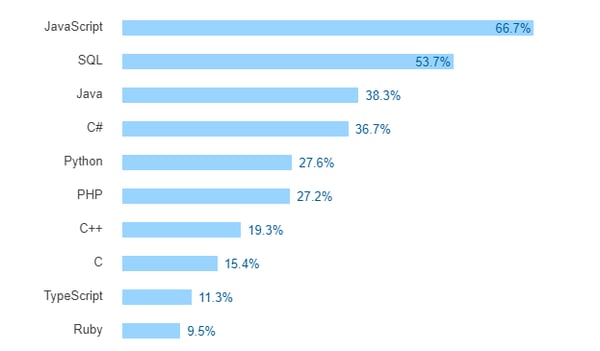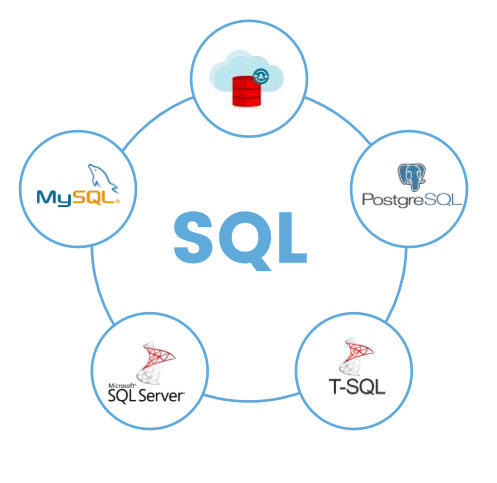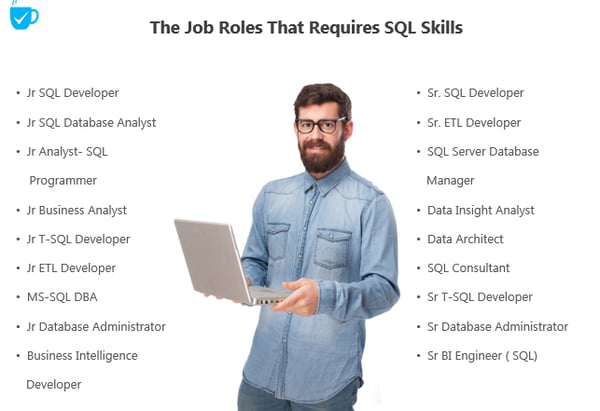SQL is the most sought after skill nowadays. If you are looking forward to hire candidates with expertise in SQL but not really aware about the importance of SQL in IT recruitment, job profile and what all things to evaluate in a candidate then the guide will provide valuable information related to SQL hiring.
Let’s get started
What Is SQL?
SQL is computer language for storing, manipulating and retrieving data stored in relational database. All relational database systems like MySQL, MSSQL, Oracle, Sybase, Informix, PostgreSQL and SQL Server use SQL as standard database language. SQL is like a database’s own version of a server-side script and is responsible for:
- Executing queries, which are “questions” asked of the database
- Retrieving data
- Editing data: inserting, updating, deleting, or creating new records
- Creating views
- Setting permissions
- Creating new databases
Want to hire the experts in SQL? Then, you must know the importance of SQL based on its usage.
- Demand: Nowadays data plays a vital role in every decision making process. SQL has become the universal interface for data analysis so is the demand for Developers with proficient knowledge of SQL. According to a research by Tableplus there are more than 1.4 lac developer jobs available out of which, around 1 Lac jobs listing are either hiring SQL developer or need SQL as an essential skill.
- Data Management: We live in an era where data is the most valuable. All companies no matter in which industry they are in, they all rely on data. They need to organize the data in simple, sorted and relevant way. The possibility is, they are going to need database professionals or SQL developer to manage the data.
- One of The Sought After Skills By Hiring: Employers are seeking out those individuals who know SQL. Nowadays they want to hire developers skilled in SQL. Because so much of our business is digital now and digital means data; data means database and to access those database an employee must know SQL.
- Dependency on SQL: We have a list of tools that depends on SQL. Many Big Data Tools Hive, Impala, Spark SQL depends on SQL. Data science tools also depends on SQL.
 According to Stack overflow Developer survey 2017 SQL is the most popular languages across web developers, desktop developers, sysadmins/DevOps, and data scientists.
According to Stack overflow Developer survey 2017 SQL is the most popular languages across web developers, desktop developers, sysadmins/DevOps, and data scientists.
Types of SQL Systems:

SQL allows a developer to work with databases with the help of a user interface. It makes the life of a database programmer much easier by automating common tasks, such as creating database, tables, extract data, make adjustment in the data, edit and delete unnecessary data.
Here are some of the most important SQL systems you should know while conducting an interview:
- Oracle Database: Oracle is the leading SQL database system in the world. It’s used in a wide range of industries, but is particularly popular in data warehousing and online transaction processing.
- MySQL: This open-source database system is available for free to individuals and businesses. It's highly popular with small businesses and startups since there's no license fee. Because of its open-source model, MySQL is used in many open-source software programs and applications
- Microsoft SQL Server: SQL Server is Microsoft’s bespoke SQL database management system. This database runs on all major versions of Windows operating systems. It's used in consumer software as well as on web servers that run Windows. It has a large user base.
- PostgreSQL: A major competitor to MySQL, PostgreSQL is another free, open source database system. It's used widely by technology startups for its free licensing model. PostgreSQL supports all major operating systems–MacOS, Windows and Linux. It places greater emphasis on following standard SQL syntax than other databases. Other databases (like SQL Server) greatly modify the SQL standard, making them harder to learn.
- T- SQL:T-SQL (Transact-SQL) is a set of programming extensions from Sybase and Microsoft that add several features to the Structured Query Language (SQL), including transaction control, exception and error handling, row processing and declared variables.

- SQL Developer is responsible for the design, development, optimization and support of business critical back end databases
- Transform data into valuable business information that can be utilized by reporting tools throughout the organization
- Design and troubleshoot complex queries, stored procedures, functions, views, indexes, constraints, unions, joins, and similar development tasks
- Develop and maintain a front-end Web applications to allow access to back end tables and data
- Create new application and maintain existing one
- Perform requirements collection, analysis, definition, and documentation activities
- Interpret business logic and develop appropriate data flows and data dependencies
- Designing and scaling big data solutions
- Proactively identify problems/issues concerning data accuracy and data integrity
- Contribute to architecture, database design and query optimization
- Define technical requirements and gain an understanding of the business to be effective at satisfying system requests
- Creating and modifying stored procedures and views and creating and modifying SSRS reports and SSIS packages
- Work with business owners to define, design, and develop requirements given time and budget constraints
- Design and develop SQL based application solutions and enhancements that meet user requirements
- Design, create, modify and test various SQL queries, stored procedures and views for obtaining data from diverse source systems and platforms
- Assist in the roll-out of new SQL based applications, problem fixes, and enhancements of software
- Understand how assigned programs link with those of other programs and the overall system schema
3. Responsibilities of Senior & Junior ETL Developer
- Provide oversight and take responsibility of delivering technical projects
- Providing guidance to the developers in delivering solutions that meets the strategic objectives
- Provides development estimates and participates in project planning
- Participates in designing and developing complex reports, analysis, and ETL by writing Design Specifications description of framework, interfaces, services, reports, business components, and interaction between the components
- Responsible for ensuring quality delivery of code through static and dynamic testing techniques
- Keep abreast of the current technologies and technological trends
- Peer mentoring experience of more junior team members
4. Responsibilities of SQL Database Administrator
- Write advanced SQL queries to transform data to into meaningful output.
- Optimize existing queries and lead efforts to establish SQL best practices
- Designs, codes, tests, debug, and enhance existing components to ensure that software meets business needs
- Develops and maintains database security and control procedures
- Work with cross functional teams
- Lead technical system support for monitoring the database performance and utilization
- Interfaces with users of data to resolve data conflicts and data usage concerns
5. Responsibilities of SQL Database Analyst
- Develop solutions using SQL Server, ETL - SSIS, Data Model and complex Stored Procedures
- Communicate data design to other members of the team to ensure proper implementation and utilization of the data structures
- Works closely with business partners and analysts to understand the data requirements and to analyze and design the necessary data flow and database design
- Work closely with business partners and analysts to understand the data requirements and to analyze and design the necessary data flow and database design
- Assure quality, maintainability for supported systems and risk applications
- Design and review database architecture of product to achieve required technical outcome
- Work with team to assist and resolve any design or technical issues
- Prepares user documentation including Technical Design Document, Implementation Plan, unit test cases and other documentation as required
6. Responsibilities of Business Intelligence Developer
- Spreadsheet manipulation, management, and reporting
- Database structure and design
- Database querying, ETL, index management, and SQL performance tuning and monitoring
- Installation, implementation, integration, training, and support for custom and third-party software solutions
- Support and maintenance of custom and third-party business intelligence applications
- Reviews business requirements
- Reviews System capabilities
- Analyzes product performance
- Determines product requirements
- Schedules software installation and upgrades
- Troubleshoots problems
- Trains end users
- Works with department directors, managers and end users to assess software application needs
- Provides input and recommendations to IT Management
.png?width=585&name=SQL-BLOG-CTA-2%20(1).png)
How to Evaluate SQL Skills in Hiring Process?
Companies want to manage their huge data, and this has consecutively created a high demand for SQL administrators, developers, business analyst, data analyst, computer programmer, IT manager etc. Evaluate these applicants based on their proficiency in SQL and hire the job fit candidate faster.
So, before you start with the process it is important that you first start with your IT recruitment campaign. You are likely to get ample of resumes and cover letters and may get confused about whom to choose for the further process. To avoid this problem you use the following recruitment tips.
1. Experience wise Technical Screening of SQL Skills:
By reading the resume you can be aware about the past experience of SQL Developer, but to ask questions and evaluate applicants you have to know what skills to look for as per the level of their experience.
In your initial phase of technical Screening you can look for the below skills:
- BEGINNER - A beginner SQL developer should know the various data types such as CHARACTER, VARCHAR, BOOLEAN, ARRAY, DECIMAL, etc. They should also know some basic functions like SELECT, COUNT, SUM, MAX/MIN, DISTINCT, and GROUP BY.
- INTERMEDIATE - An intermediate SQL developer should know all of the SQL data types as well as some more complex functions. They should have good knowledge of functions like JOINS, NULL HANDLING, and EXISTS.
- ADVANCED - An advanced SQL developer should have a grasp on functions, data pivots, triggers and errors like COMMIT ROLLBACK
2. Fill-in Missing Information through Phone Screen:
If you still think that the candidate is a good fit but certain elements are missing and you’re troubling to gain some specific information from their resume. Then get a better understanding of candidate’s background and work experience relate to the position you are looking to fill and ask them surface level questions like:
- How does your experience prepare you for this job?
- Do you think your experience matches the needs of the role?
- With which technology you have commercial experience in the past years?
- What were your responsibilities?
- Which was you recent project? At what stage you were involved? Which RDBMS you used for the same project?
With the help of these question you will be able to find out candidate’s knowledge about SQL, their understanding of their responsibilities of the current position, their expertise in handling complex and important projects.
3. Simulators:
A Simulators play a very important role in evaluating database programming skills with SQL challenges that help you identify the best Database developer for your organizations. It provides real life scenario and gauges candidate’s ability to write optimized query to access data from SQL Database well before face-to-face interview.
Benefits of Simulation you need to know:
- More accurate than interviews
- Help reduce bias
- Help candidates gauge their interest
- Help organizations see a candidate’s work skills in action
4. Online SQL skills assessment:
The most effective way to assess the Database skills is online SQL skill test. It helps technical, non-technical recruiters and hiring managers to quickly conduct a pre-hire screening of applicants and filter out the best candidates by reducing time-to-hire up to 50%.
How SQL skills assessment help companies hire great SQL Developer:
- Increases Productivity: With the help of online SQL assessments recruiters and hiring managers are now able to spend more time on evaluating proficient candidates by eliminating unfit candidates before face to face interview.
- Ready- to-use SQL skill tests: The tests are a perfect combination of theory and practical questions to evaluate candidate’s knowledge on various SQL concept and coding too.
- Reduces time-to-hire: The SQL knowledge test reduces time-to-hire up to 50% and help you hire job fir candidates faster.
- Provides detailed analysis: A set of integrated data and hiring analytics and reports make hiring managers and recruiters take a better hiring decision.
The best way to hire SQL experts is to make use of SQL assessment test. The pre-employment assessment platform helps you to evaluate candidate technical skills by using different types of questions like subjective, MCQs and you can also check their practical knowledge using simulators. The online pre-hire assessments enables candidates to take the test anytime, anywhere in their comfort zone. The advance proctoring makes your recruitment process extremely effective and flexible.
- SQL Online Test- Fundamental Assessment
- SQLite Online Test
- T-SQL Online Test
- My SQL Online Test
- MSSQL Online Test (Advance)
- MSSQL Online Test (Basic)


